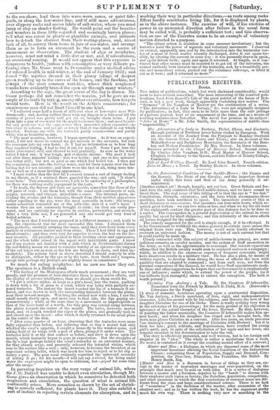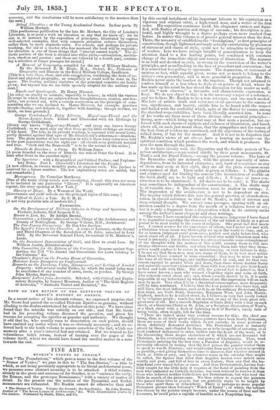PUBLICATIONS RECEIVED.
Booms. •
THE influx of publications, which last week slackened considerably, would seem to have revived somewhat The most interesting of the reserved pub- lications, Lord John Russell's Life of the great patriot of the house of Bed- ford, is not a new work, though apparently containing new matter. The " Sermons " of Dr. Vaughan of Harrow are the continuation of a series. "The Adventures of a Lady in Tartary," &c. were not originally designed for publication ; in fact, they seem to be little more than the curt jottings of a private journal, kept as an amusement at the time, and as a means of reviving reminiscences hereafter. The novel has promise in its subject : "John at Home" is Mr. John Smith, the representative of middle class "respectability."
The Adventures of a Lady in Tartary, Thibet, China, and Kashmir, through portions of Territory never before visited by European. With an Account of the Journey from the Punjaub to Bombay Overland via the famous Caves of Junta and Ellora ; also an Account of the Mahablesliwur and Neilgherry Mountains, the Sanataria of the Bom- bay and Madras Presidencies. By Mrs. Hervey. In three volumes. Sermons preached in the Chapel of Harrow School. Second series. By Charles John Vaughan, D.D., Head Master of Harrow School, Chaplain in Ordinary to the Queen, and late Fellow of Trinity College, Cambridge.
Life of Lord William Russell. By Lord John Russell. Fourth edition. John at Home ; a Novel. By Stanley Herbert. In three volumes.
On the Deteriorated Condition of Our Saddle-Horses : the Causes and the Remedy. The State of our Cavalry, and the imperfect System under which this force and that of our Army generally is ad- ministered.
[Another extinct art though, happily, not yet lost. Great Britain and Ire- land were the only countries that bred saddle-horses, and we have ceased to breed them. The real cause of this falling-off is that the age is "too fast." Constitution, strength, endurance, and the form which accompanies those qualities, have been sacrificed to speed. The immediate source of this is short distances at race-courses. Our ancestors ran four-mile heats, which re- quired great bottom : we run two miles or less, and when we try the old feats of the eighteenth century the greater part of this distance has to be done in a canter. The consequence is, a general depreciation of the animal in every quality but speed for short distances; and this inferiority of the sires affects all horses designed for the saddle.
The remedy suggested for the evil is simple enough, if it be effectual. It is for Government to withhold the stakes granted to certain races unless the original heats were run. This, however, would seem hardly effectual to overturn an universal fashion. The money is not of such amount but that it could readily be made up.
Closely connected with this subject of saddle-horses in general, are some judicious remarks on cavalry mounts, and the system of Staff promotion in the Army, as well as the appointments to command. Our veteran equestrian affirms that the British cavalry would soon be rendered useless in a campaign ; which, in addition to the enormous expense of frequent remounts, might have disastrous results in a military view. He has also a plan, by means of written reports, to develop from among the mass of officers the men with qualities that are adapted to command ; and from such men, not from the personal connexions of the General, he would have Staff appointments made. In these and other suggestions he forgets that our Government is emphatically one of influence; under which, to extend the power of the people, (as it has hitherto been managed,) seems to extend the corruption. The book is worth perusal.]
Christine Tan Anzberg ; a Tale. By the Countess D'Arbouville. Translated from the French by Maunsell B. Field, M.A. (Bosworth's Literature for the People.)
[A story of domestic harshness operating upon a sentimental disposition. Mr. Van Amberg, a Dutch merchant, of firm, rigid, and undemonstrative character, kills his second wife by his coldness, is thwarts the love of her daughter Christine for one of his clerks. There is really nothing very wrong in the substance of his proceedings ; for the main ground of his objection is ignorance of the actual character of the lover, Herbert. By dint, however, of painting the father unamiable, the Countess D'Arbouville makes him ap- pear harsh; and when his daughter has eloped and is brought back, the stern man places Christine in a convent. After five years, an uncle procures Van Amberg's consent to the marriage of Christine with Herbert : laut it is then too late ; grief, solitude, and hopelessness, have crushed the young girl's spirit, and, in spite of the solicitation of her uncle and her lover, she remains steadfast in her determination to take the veil.
The story is effectively presented, and well written, but is too foreign and singular in its "idea.' The whole is rather a misfortune than a fault. No moral is contained in it except the crushing mental effect of a convent.] Master and Man: a Dialogue in which are discussed some of the most important Questions affecting the Social Condition of the Industrious Classes ; comprising those of Population, Supply and Demand, Com- petition, the Poor-law, Education, the Franchise, the Ballot. By Henry Booth, Esq. [Master and Man is a discourse in favour of things as they are, ex- cept in the matter of imprudent marriages and over-population, on the principle that much may be said on both sides. It is a series of dialogues between a master and a foreman, deputed by the " hands " to discuss with their employer such topics as luxury, the franchise, population, competition, and other questions in which the first conclusions of common sense are dif- ferent from the close and large oonsiderationsof science. There is no lack of "soundness" in the doctrines of the master, after economists of the straitest sect ; and as he has written the book, he has the argument pretty much his own way. There is nothing very new or searching in the
economy, and the conclusions will be more satisfactory to the masters than the men.]
School Elocution ; or the Young Academical Orator. In four parts. By William Herbert.
[This posthumous publication by the late Mr. Herbert, the City of London's Librarian, is as good a work on elocution as any that we know of; for its aim is to instruct by the exposition of principles, illustrated by copious well-selected examples, that with common attention enforce themselves, rather than by mere dogmatic rules. For schools, and perhaps for private teaching, the aid of a master who has mastered the book will be requisite ; for elocution is one of those things that "precept cannot teach." The di- dactic portion of the book is divided into three parts,—articulation, modula- tion, emotion and passion ; and these are followed by a fourth part, contain- ing a selection of longer passages for recital.]
Manual of Geography, compiled for the use of Military Students. By the Reverend E. M. Reale, M.A., Oxford, &c. Professor of Geography and History in the Royal Military College, gandhurst. [This is a very close, clear, and able coniuilation, combining the facts of po- litical and physical geography, as completely as could well be done in the space. The leading military statistics of the principal countries are briefly given; but beyond this we see little specially adapted for the military stu- dent.] Bipeds and Quadrupeds. By Harry Hieover. An essay on cruelty to animals, especially to horses ; in which the various ill-usage to which Cliff are subjected from thoughtlessness, avarice, and bru- tality, are pointed cad, with a certain reservation on the principle of com- pounding sins we are inclined to. Harry hoover, for example, practises steeple-chasing, and defends it, together with hunting ; though neither, we think, on true grounds.] George Cruikshank's Fairy Library. Hop-o'-»iy-Thumb and the Seven-League Boots. Edited and Illustrated with six Etchings by George Cruikshank.
[Every one knows "Hop-o'-my-Thumb," and every one knows George Cruikshank : so we need only say that these pretty little etchings are worthy of his hand. The tale, in its present wording, is seasoned with moral hints, partly directed against that ogre of Mr. Cruikshank's abhorrence—drunken- ness. The plain matter of fact narration in which these fairy-tales were told to the past generations was the right one : all should seem perfectly natural and true. "Jack and the Bean-stalk" is to be the second of the series.] Blanche de Bourbon, a Poem. By William Jones. [A poem founded on the story of Blanche the wife of Peter the Cruel. It is done after Scott in the exactest style.] The Spectator : with a Biographical and Critical Preface, and Explana- tory Notes. Part I. (Bosworth's Literature for the People.) [A new edition, in twenty monthly parts, at sixpence each. The preface is reserved for a future number. The few explanatory notes are useful, but not remarkable.] Moneypenny. By Cornelius Matthews.
[One of the many cheap novels now circulating, though this does not seem to be included in any particular "library." It is apparently an American reprint, the story opening at New York.] Slavery at Home. By a Woman of the World. [Governesses and girls' schools are the principal topics of this essay.] Wilfred de Lisle; a Tale. By C. H. H.
[A not very probable tale of modern life.] PAMPHLETS.
On the Development of Military Offences in Camp and Quarters. By Frederic Roberts, Staff Surgeon S. C.
Russia is Lost, &c. By Adolph Berend.
Convocation' a Charge addressed to the Clergy of the Archdeaconry and County of Nottingham. By George Wilkins, D.D., Archdeacon. The Pro-Popery Conspiracy. By Pen Cloy Jocelyn.
The Spirit's Voice to the Churches. A series of Lectures, on the Second and Third Chapters of the Revelation of St. John, preached in Lent 1853. By the Reverend Samuel Flood, Incumbent of St. Matthew's, Leeds.
On the Imminent Depreciation of Gold, and How to avoid Loss. By William Austin, Barrister-at-law.
City Committee for the Reform of the Customs. Reasons against Sup- porting the Bill "To Amend and Consolidate the Laws relating to the Customs," &e.
Chaplain's Report on the Preston House of Correction. Monsieur Louis Bonaparte an Confessional. Remarks on the Purchase, Value, Management, and Letting of _Landed Property : with several useful Tables, by which the rental value may be ascertained of any number of acres, roods, or perches. By George John Rhodes, Surveyor. Emigrants' Letters from Australia. Selected, with Critical and Expla- natory Remarks, by Samuel Mossman, Author of "The Gold Regions of Australia," "Australia Visited and Revisited," &c.



































 Previous page
Previous page